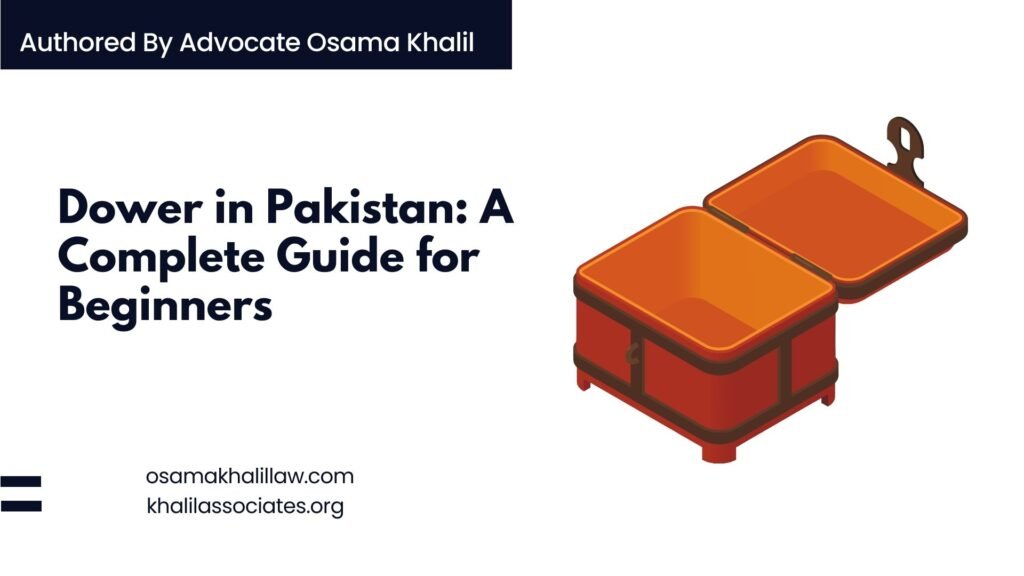
Dower in Pakistan, also known as Haq Mehr or Mahr, is a fundamental right of a Muslim wife. The husband must give this mandatory gift to his wife at the time of marriage. Moreover, dower in Pakistan ensures financial security for the wife.
Furthermore, Islamic law clearly defines Meher in Pakistan as a sacred obligation. The Quran and Sunnah emphasize its importance. Therefore, every Muslim marriage in Pakistan must include Meher.
What Is Dower in Pakistan?
Meher in Pakistan refers to the money or property that a husband promises to his wife during the marriage contract. Additionally, it acts as a financial safeguard for the wife.
Moreover, dower in Pakistan is not a dowry. Many people confuse the two, but they are entirely different. While dowry involves gifts from the bride’s family to the groom, dower is the husband’s responsibility.
Types of Dower in Pakistan
Dower in Pakistan has two main types: prompt dower and deferred dower. Both serve different purposes and have distinct rules.
1. Prompt Dower (Muajjal)
Prompt dower means the wife can demand it immediately after marriage. Furthermore, if the husband fails to pay, the wife can legally enforce it.
2. Deferred Dower (Mu’wajjal)
Deferred dower means the wife receives it later, usually upon divorce or the husband’s death. Additionally, this type ensures long-term financial protection.
Legal Importance of Meher in Pakistan
Dower in Pakistan holds significant legal value. The Family Courts Act and Muslim Family Laws govern it. Moreover, the wife can claim her dower anytime.
Furthermore, if the husband refuses to pay, the wife can file a case in family court. The court can then order the husband to pay the dower amount.
How Is Meher in Pakistan Decided?
The amount of dower in Pakistan varies. Sometimes, families agree on a fixed amount before marriage. Other times, the bride and groom decide together.
Additionally, Islamic law does not set a minimum or maximum limit for Meher in Pakistan. However, it should be reasonable and fair.
Rights of a Wife Regarding Meher in Pakistan
A wife has complete rights over her dower in Pakistan. She can use it as she wishes. Moreover, no one, including her husband, can force her to give it up.
Furthermore, if the husband dies before paying the dower, the wife can claim it from his estate.
Can Dower in Pakistan Be Waived?
A wife can voluntarily give up her Meher in Pakistan. However, the law ensures she does so without pressure. Additionally, courts carefully examine such cases to prevent coercion.
What Happens If Meher in Pakistan Is Not Paid?
If a husband does not pay the Meher in Pakistan, the wife has legal options. She can approach the family court. Moreover, the court can order the husband to pay or face consequences.
Difference Between Dower and Dowry in Pakistan
Many people mix up Meher and dowry in Pakistan. However, they are not the same.
Dower is the husband’s gift to the wife. On the other hand, dowry includes gifts given by the bride’s family to the groom.
Common Misconceptions About Meher in Pakistan
Some people think Meher in Pakistan is outdated. Others believe it is optional. However, Islamic law makes it compulsory.
Moreover, some husbands try to avoid paying dower. But the law protects the wife’s rights.
How to Register Dower in Pakistan
Registering dower in Pakistan is crucial. The Nikah Nama (marriage contract) must mention the dower amount. Additionally, witnesses should verify it.
Furthermore, a registered dower prevents future disputes.
Enforcement of Dower in Pakistan
If a husband refuses to pay Meher in Pakistan, the wife can take legal action. The family court can enforce payment. Moreover, the court may also impose penalties.
Conclusion: Why Meher in Pakistan Matters
Dower in Pakistan ensures a wife’s financial security. It is her Islamic and legal right. Moreover, husbands must fulfill this obligation.
Understanding Meher in Pakistan helps both spouses protect their rights. Therefore, every Muslim couple should learn about it before marriage.
Legal Assistance
For professional legal guidance and support in immigration matters, you may contact:
Mr. Osama Khalil
Lawyer & Legal Consultant
📞 Phone: 0316-1829946
📧 Email: contact@osamakhalillaw.com | contact@khalilassociates.org
